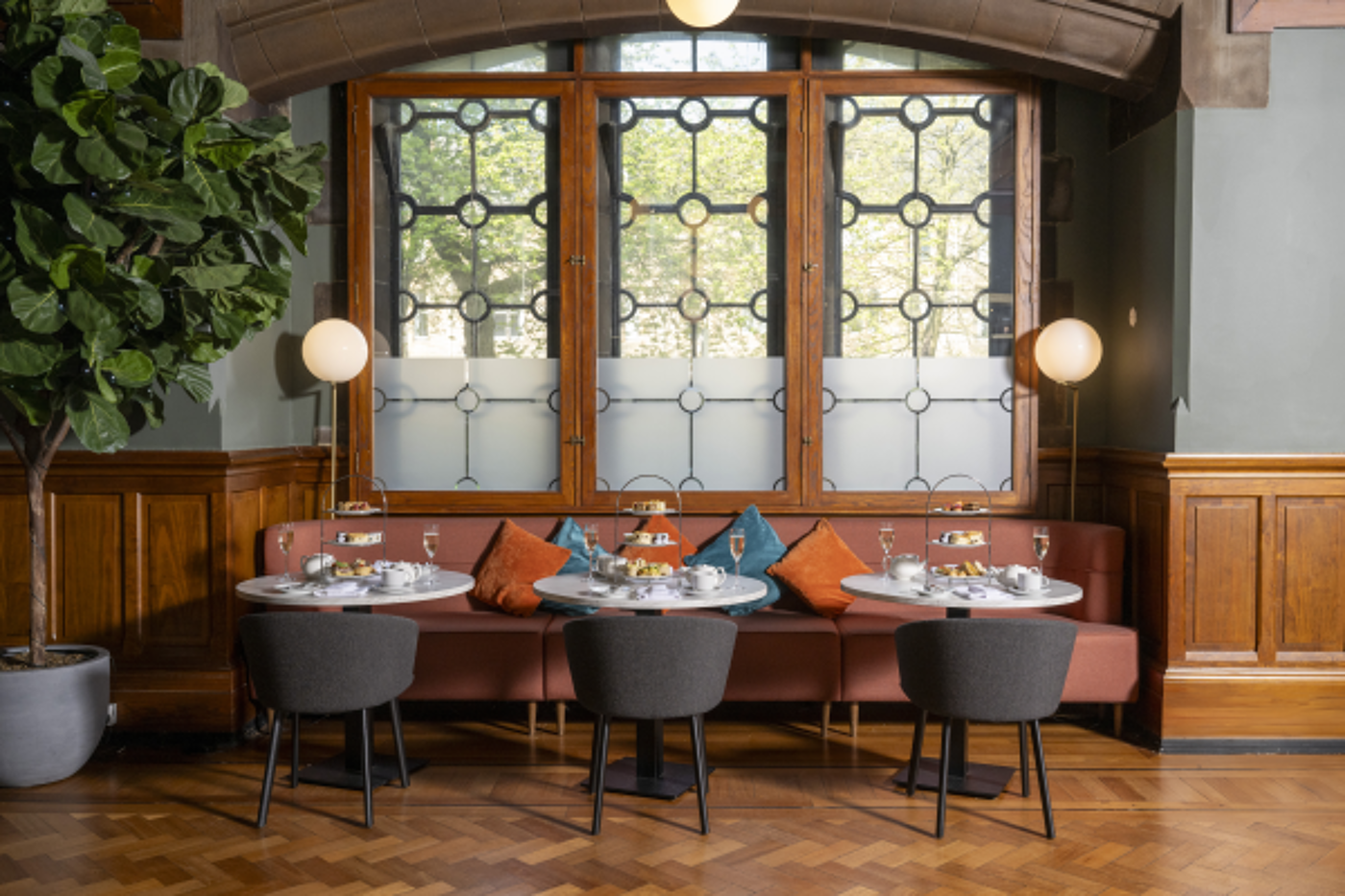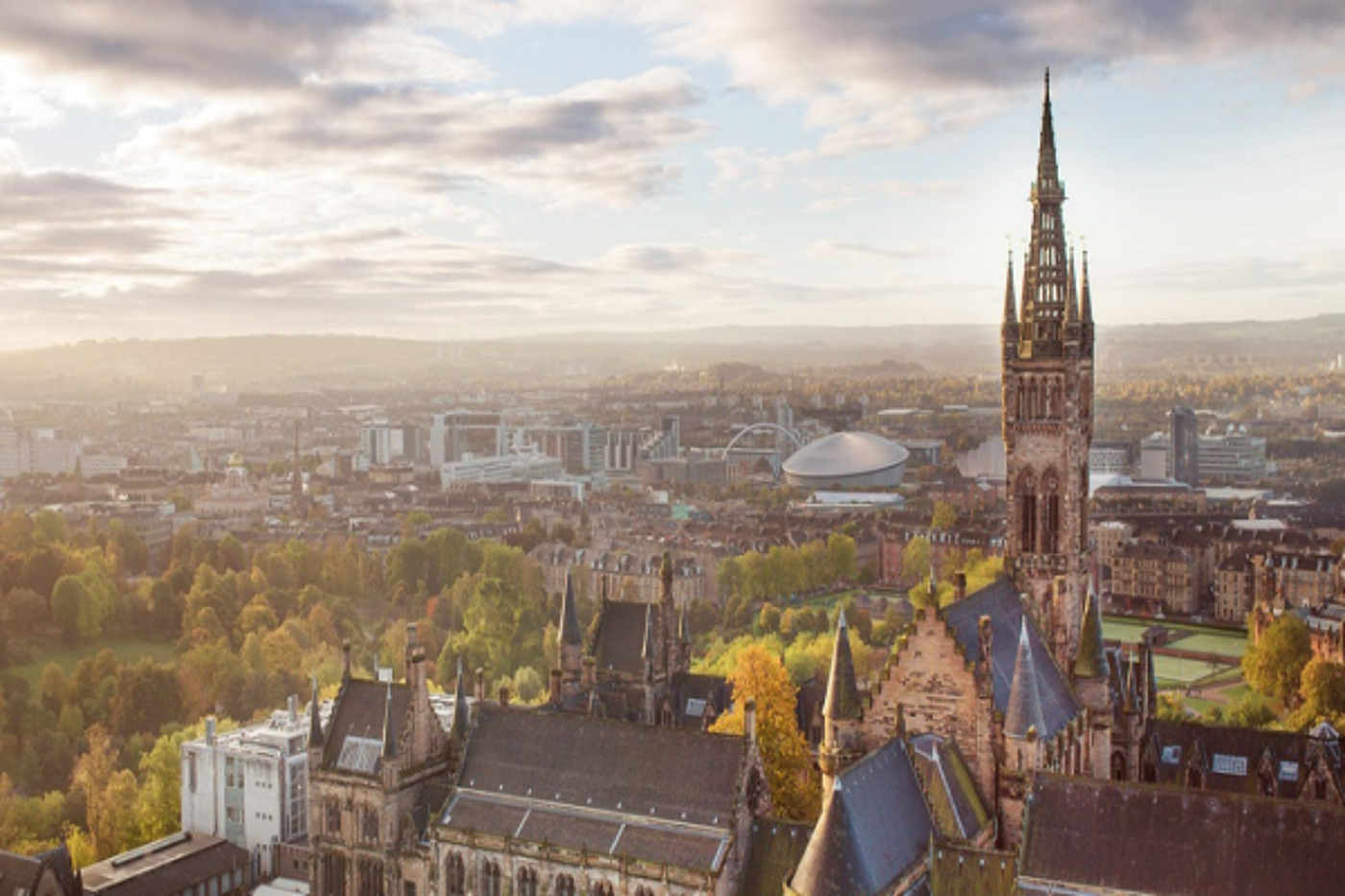Sustainable Catering
The University of Glasgow is committed to making the food we serve sustainable. In order to achieve its sustainability goals our Catering and Events Team have developed a Sustainable Food Policy [see below]. Catering and Events are working to promote sustainable alternatives to students and staff through initiatives such as ‘sip responsibly’ with Keep Cups, free water bottle refill stations and the provision of vegetarian, vegan and plant-based options at all of our outlets. We are introducing sustainability as a key section of our all staff training programme, to increase awareness of healthy and sustainable food options, locality of suppliers, freshly produced dishes and seasonal ingredients we use daily. The Catering and Events Team value social and environmental responsibility, and we encourage sustainable eating habits across campus, to both students and staff.Sustainable Policies
Sustainable Procurement Policy
Procurement Sustainable Code of Conduct
The Catering & Events team work closely with the University's procurement department to ensure that sustainable and ethical policies are followed in all procurement activities. We are committed to offering more opportunities to small businesses and social enterprises. This involves inviting them to tender and assisting them in the process. Our tenders now include a broader range of questions about sustainable and ethical practices and reporting.
Ecovadis is a platform used by many of our suppliers that enables procurement to monitor sustainable and responsible practices across the supply chain. The system allows the evaluation of various topics, such as environmental impact, ethics, labour and human rights.
Sustainable Food Policy
Soil Association
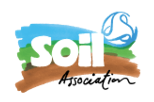
We are working to achieve the Bronze Accreditation with Soil Association by the beginning of 2025. The charity is the largest organic certification body in the UK. After meeting the 12 standards required (see them below), we will work towards the next level of accreditation, Silver, which will involve using more organic produce.
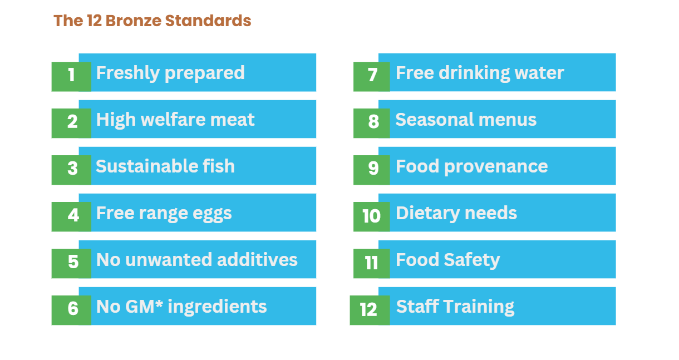
Responsible Health and Nutrition Policy
Responsible Health and Nutrition Policy
The purpose of this policy is to outline our commitment to improving the health impact of the menu we offer, ensuring that we contribute positively to the health and well-being of students and our customers.
We are committed to improving the health impact across the University campus by:
- Limiting unhealthy ingredients: We work with Soil Association to ensure that we freshly prepare dishes and use high quality ingredients. We are limiting GM ingredients and additives and are actively seeking healthier alternatives.
- Offering nutritionally balanced options: Our menus feature a variety of seasonal fruit and vegetables and well-balanced options, along with healthier side dishes.
- Transparency: We provide clear and accurate nutritional and dietary information for all menu items to help customers make informed decisions. We aim to provide carbon emission labelling in 2025 on all in-house prepared food, so customers are enabled to choose lower emission dishes.
- Dietary options: We cater to all diets including plant-based, vegan, vegetarian, halal, gluten-free, dairy-free and allergen free choices.
- Promotion: Our goal is to increase awareness around healthy alternatives and schedule targeted product launches. We have also created a suite of sustainable fact sheets for staff and customers. We have committed to promoting sustainable and healthy foods and will continue to limit promotion of any unhealthy products.
- Portion control: We allow customers to customise their own salad bowls and offer a variety of sizes in many of our products. We accurately measure ingredients and optimise use of resources, and often pre portion ingredients.
- Staff training: We provide training to all of our staff around portioning methods and tools. Additionally, they are trained on sustainable and responsible eating habits to help educate the wider team and inform customers.
Sustainable Suppliers
B-Corp
We work with many B-Corp accredited food and drink suppliers, this ensures that suppliers meet high standards of social and environmental performance, transparency, and legal accountability. We will be highlighting B-Corp products throughout 2025 to encourage more sustainable and ethical purchases across our community.
Here's a list of our current B-Corp suppliers:
Sanpellegrino
Tugo
Lomond Foods
Coffee Suppliers
At the University, we have 11 outlets offering coffee across campus. To support our commitment to sustainability, we have appointed six new coffee bean suppliers who prioritise positive impacts on the environment and their communities. Our selection criteria had focus on sustainable initiatives, credentials, and social benefits, in addition to price and quality. Five of these suppliers are based in Glasgow and Lanarkshire, which helps support local businesses and ensures a low carbon footprint.
In our barista made coffee we use Mossgiel local and organic whole milk as standard, to ensure you receive a great tasting velvety coffee at all times. Please see more information on Mossgiel below.

Papercup are located just 600 metres away from the University of Glasgow campus, which minimises our carbon footprint of deliveries. They use fully biodegradable bags in their packaging and offer discounts to customers who bring their own containers for purchasing coffee. Additionally, the roastery reinvests 10% of its profits into training and development and is actively working toward B Corp certification.
We have developed a bespoke UofG blend with Papercup, from Brazillian and Colombian beans, which will be available to buy soon from The Western Cafe and the UofG Shop.

Matthew Algie achieved the world's first coffee triple certification, which includes Fairtrade, Organic, and Rainforest Alliance. They also continue to assist coffee producers in obtaining these certifications. Matthew Algie has partnered with the John Muir Trust in Scotland to help conserve and protect Scotland's rainforests through their Peak & Wild blend.

Coffee Conscience have worked with Fairtrade for 26 years. They provide Fairtrade products, including coffee beans, tea, and chocolate. Their warehouse is a zero-waste-to-landfill site, where they recycle all packaging materials. In 2023, Coffee Conscience also planted orchards, which helped offset three tonnes of carbon emissions. Additionally, the brand collaborates with various food banks throughout Glasgow, engaging local children in their efforts.
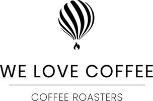
We Love Coffee support projects in its local area, such as Children's Children's Hospice and Young Enterprise Scotland, which offers development opportunities to young people throughout the country. It also helps local schools and other community projects. They work with local suppliers to minimise environmental impact and support Fairtrade and ethical practices. We Love Coffee use a custom-built, low emissions hot air roaster and are actively working toward B Corp certification.
![]()
Dear Green are B Corp certified and committed to measuring, monitoring, and reporting their environmental impact to achieve net-zero emissions by 2030. Additionally, the business donates 1% of its revenue to environmental initiatives, such as projects in Scotland and support for coffee farms. It also contributes another 1% to programs that benefit local communities and empower women. They use energy efficient equipment and have reusable biodegradable packing solutions.
Dear Green were recently named the best coffee roasters in the world!
*Dear Green coffee is coming soon to the University!
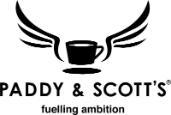
Paddy & Scott's collaborate with Fairtrade, the Rainforest Alliance, and UTZ to support projects in Brazil, Ethiopia, and Vietnam. They engage in direct trade with coffee suppliers to ensure the fairest trading practices and in 2023, they donated 12% of their profits to coffee community projects. Their coffee packaging is made from recyclable PET material that is free from aluminium. The paper cups are compostable, the lids are made from corn starch, and the coffee bags are crafted from compostable potato starch.
*Paddy & Scott's coffee is coming soon to the University!
Organic Milk
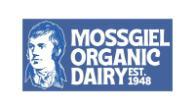
Mossgiel is an organic farm located in East Ayrshire, Scotland, that offers organic whole and semi-skimmed milk. Their cows are grass-fed, and the calves stay with their mothers until they are four months old. The milk undergoes a low and slow process, which allows the cream to naturally rise to the top, ensuring maximum quality. Additionally, the milk is delivered in reusable containers that are returned daily for washing and reuse, completely eliminating the use of single-use plastics. We have saved 234,276 pieces of single use plastic from landfill by using Mossgiel.
We use Mossgiel in every outlet across campus and in our catering services so you are always being served organic milk. This provides you with a thick and creamy milk. Due to the high fat content, the milk served cold can often look extra creamy and a little different to what you may be used to with store bought non-organic milks. If you prefer an alternative please ask your server.
Bottled Water
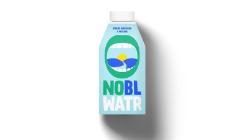
We have partnered with Nobl Water to sell still water bottles in every outlet. They are 100% recyclable (including the caps!) and made from 95% plant-based materials, responsibly sourced and produced with renewable energy. The company also plants one tree for every case sold, which we hope will soon result in a UofG forest.
[Free water stations are also available across campus]
Sustainable Food
Inclusivity
We are committed to providing diverse and sustainable food options that meet the dietary needs of our community. We cater to plant-based, vegan, vegetarian, halal, gluten-free, and dairy-free diets, as well as offering allergen-friendly meals. In support of sustainability, we feature bean-based, low-emission meal alternatives and aim to carbon label all in-house made products, enabling individuals to make more sustainable choices. Our goal is to provide nutritious and inclusive meals while minimising environmental impact.
Menus
These menus are served daily from the JMS Hub kitchen, where we freshly prepare our food.
Our Plant Fusion menu is predominantly plant-based, however, occassionally we may substitute some items. The entire menu is vegan.
Full of beans is a city-wide campaign which aims to promote greater consumption of beans and pulses as part of a healthy, planet-friendly diet in Glasgow.
Meat and Fish Products
All of our meat is Red Tractor certified:
This covers all areas of food production from animal welfare and food safety to traceability and environmental protection.
All of our fish is Marine Stewardship Council (MSC) certified:
MSC is an international non-profit organisation. Their mission is to use ecolabel and fishery certification program to contribute to the health of the world’s oceans by recognising and rewarding sustainable fishing practices, influencing the choices people make when buying seafood and working with our partners to transform the seafood market to a sustainable basis.
Full of Beans Campaign
Full of Beans is a collaborative campaign between Glasgow Food Policy Partnership and Glasgow Community Food Network's Food and Climate Action project with the aim of getting people in Glasgow eating more beans.
This city-wide campaign aims to promote greater consumption of beans and pulses as part of a healthy, planet-friendly diet in Glasgow.
The campaign is Glasgow's version of the global campaign, Beans is How, in response to SDG2 - The UN's Sustainable Development Goal 2.
In the James McCune Smith Hub Kitchen, we support the Full of Beans campaign, serving a dish made with beans or pulses daily. Beans are plant-based protein and fibre-rich, which is good for heart and gut health and considered an alternative to animal products. They also benefit the planet because they don't need too much water, are low in carbon, and help enrich the soil by fixing nitrogen.
Salad Bar
We have recently reintroduced and expanded our salad bar offering in the JMS. This sits within the To Go area and the bar offers more options for fresh produce and protein alternatives. Customers can buy a bowl and choose their ingredients. It's an excellent option for keeping calories low and health high. The salad bar aim is to encourage more fruit and vegetables into diets but allow people the choice to pick and choose what suits their cravings.
Sustainable and Healthy Food Accreditations
We are working towards two key sustainable accreditations, which we aim to achieve by 2025:
Sustainable Restaurant Association
The University of Glasgow is a member of the Food Made Good programme, which was developed around the SRA's well respected sustainability framework. Within this there are three key areas of focus:
- Sourcing
- Society
- Environment
Soil Association Bronze Accreditation
Click here to see the twelve standards - these are reflected in our food policies across campus.
Responsible Waste
Compostable, recyclable and reusable packaging policies
All disposable cutlery and packaging used in our catering and hospitality areas are either compostable or recyclable. We are committed to eliminating single-use plastics in our in-house operations and increasing the availability of reusable packaging and crockery across campus. This initiative is being implemented in outlets such as The Western, the Coffee House, the Gilchrist, and the in the future Tinderbox from the Adam Smith Business Building.
Keep Cup
The UofG-branded Keep Cups are now easily available in our outlets for just £9.95, with the first coffee free. In addition, customers receive two loyalty stamps if they use their reusable cup, as part of our 'sip responsibly' initiative. This rewards sustainable practice and offers value for money.
In 2024, we also provided a Keep Cup to all Catering and Events staff to minimise waste and raise awareness among our employees about the importance of reusing materials.
Aqua Libra
We are now refilling our glass bottles through an Aqua Libra water machine, instead of single use glass or plastic bottles, for all delivered catering and hospitality operations. The water tap in the main kitchen allows us to minimise waste and again, reuse materials. It is an energy-efficient machine and produces zero-tap limescale.
Circular & Co
We have recently partnered with Circular & Co and plan to have a returnable cup scheme around the campus. The idea is to offer customers the take-away experience but using a cup that allows up to a thousand uses and is made of recyclable PP, for as cheap as a £1 deposit - which you can either claim back or receive a fresh cup for. This scheme will be implemeted in our delivered catering offer instead of single-use disposables by the end of 2024. We plan to implement this across outlets by the end of 2025.
Enva
Enva collects the food waste produced at our outlets. They take the bins to a plant that decomposes the organic material through anaerobic digestion to convert it into biomethane. his gas can then generate electricity or heat, and the sub-products become high-quality organic fertilisers.
Eco-Hub
Aligning with our commitment to people and planet, we’re building a partnership with the UofG EcoHub. We have supported the set-up of the EcoHub (run by UofG GUEST team), by providing them with second hand and reused catering equipment. We also sourced free rerouted coffee beans from our supplier, Coffee Conscience, which are all sustainably sourced
Catering and the UN Sustainable Development Goals
- We are proud to serve Fairtrade, Rainforrest Alliance, organic and sustainably and ethically sourced coffee
- We are proud to serve locally farmed, organic milk
- We are phasing out single use plastics
- We offer free water bottle refill stations across campus
- Our catering outlets and our hospitality operations use only compostable, recyclable or reusable packaging and tableware
- We are committed to using local and sustainable suppliers across all operations, to cut down our food footprint
- We offer vegan, plant-based and low emission food and cater to all diets
- Sustainable Food Policy



